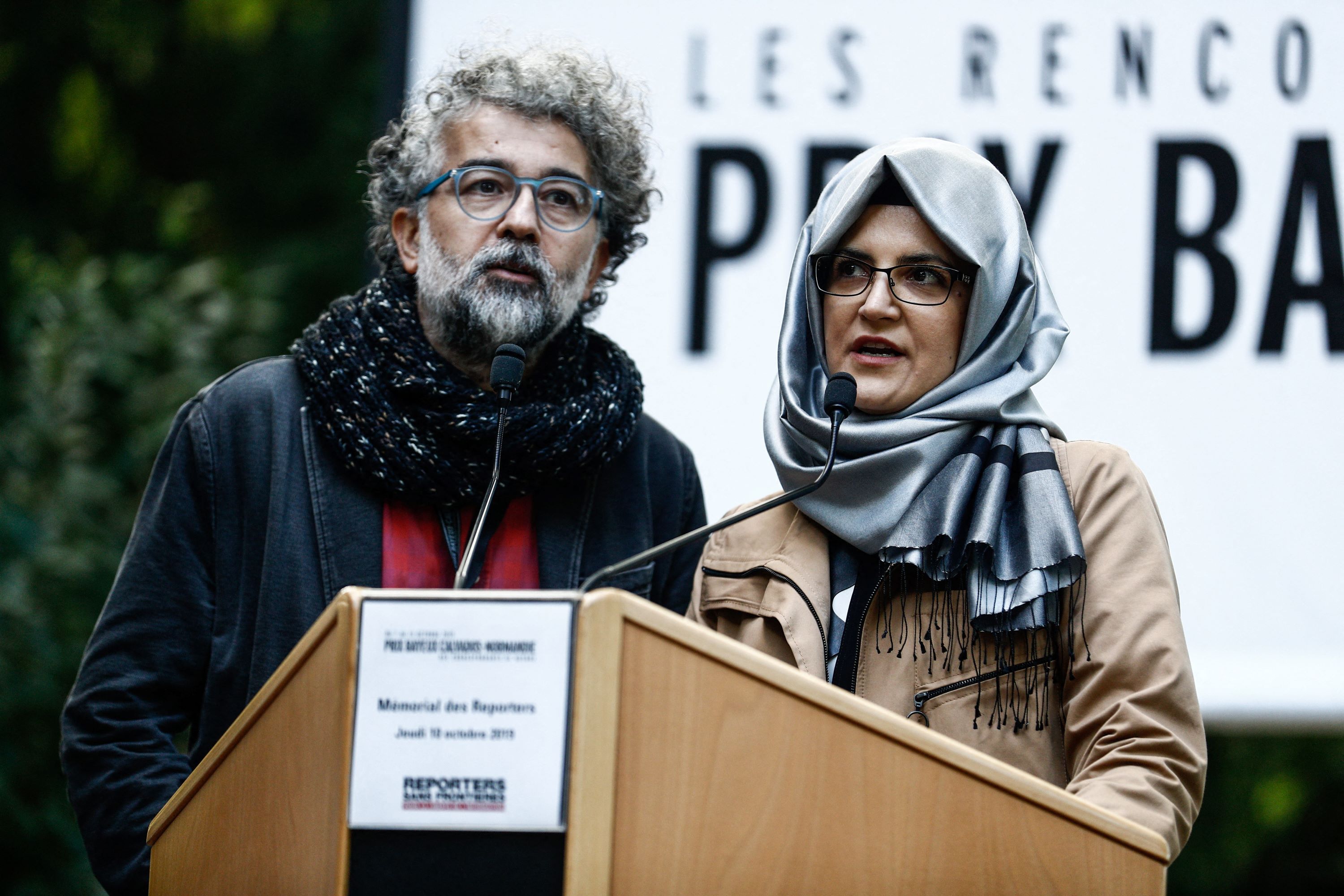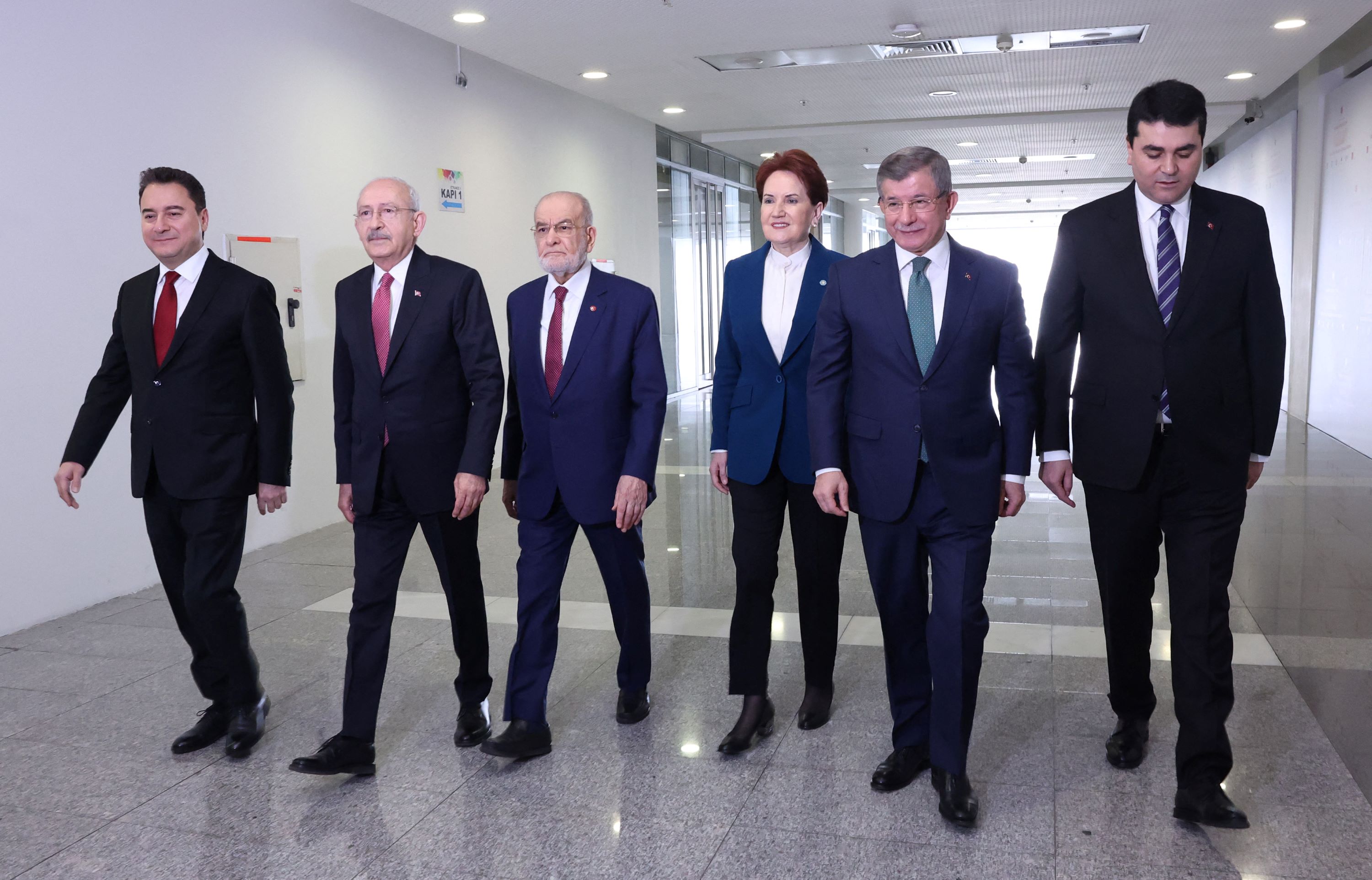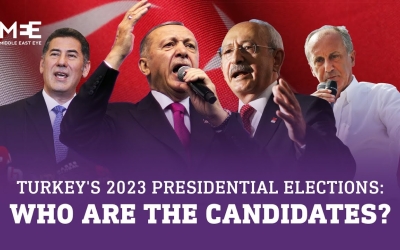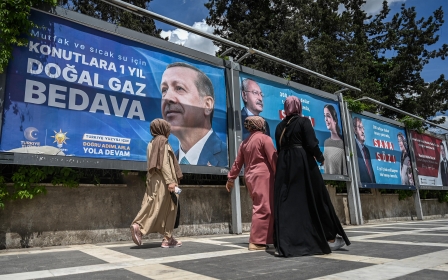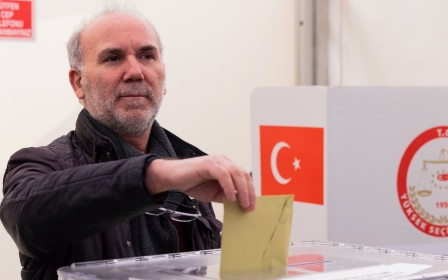Turkey elections: Persecuted journalists cautiously hopeful of change
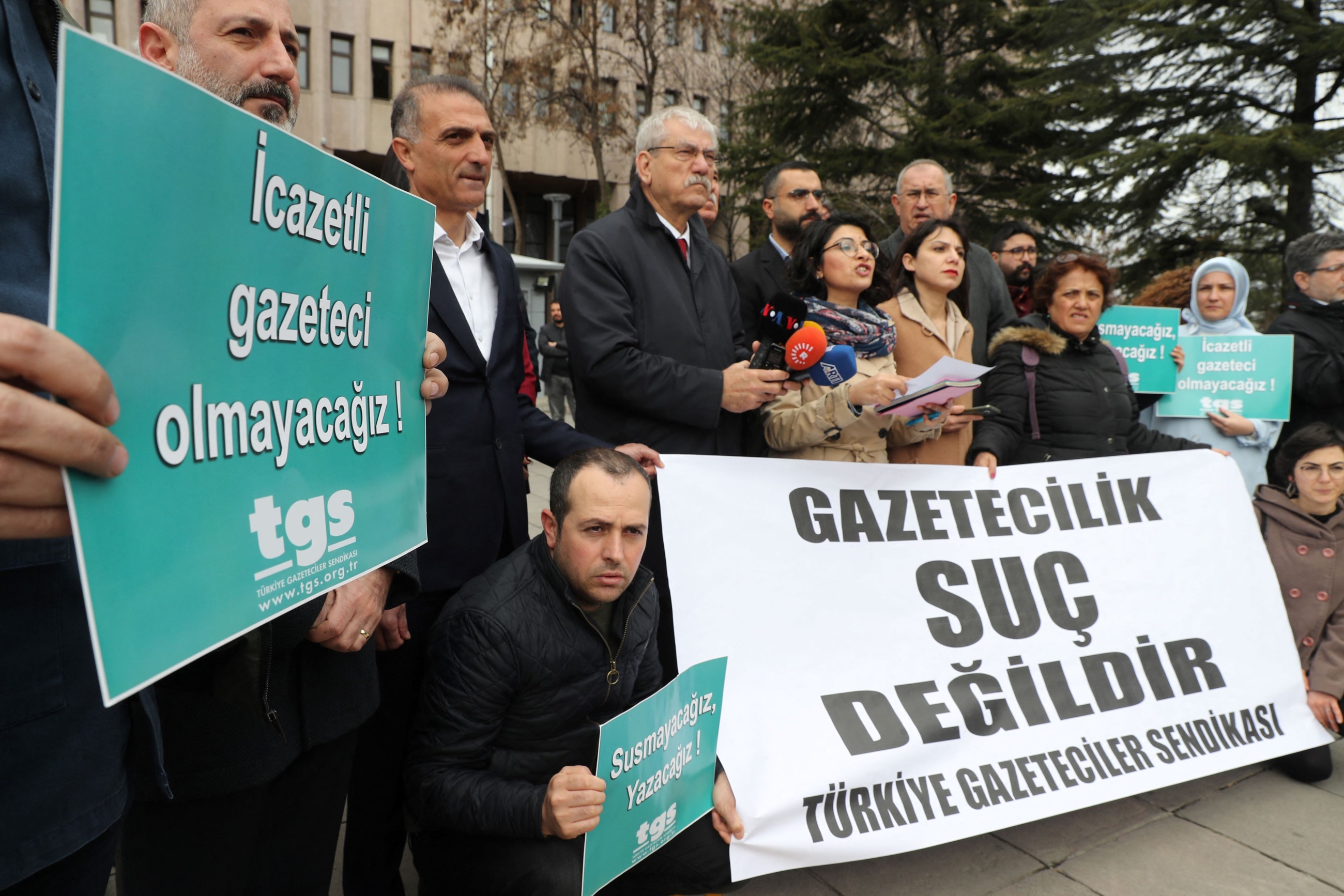
For many years Turkey has regularly been described as the "world's worst jailer of journalists".
While the country was never exactly a paradise for reporters, the years under President Recep Tayyip Erdogan's rule have seen unprecedented numbers thrown in prison, placed under travel bans or forced into exile.
This Sunday, the people of Turkey take to the polls for the first elections in many years that have the realistic potential to unseat Erdogan and his Justice and Development Party (AKP).
But while those who have faced persecution under the AKP will certainly be glad to see the back of the party, they are far from certain that a new government led by the opposition Nation Alliance will see Turkey transformed into a beacon of media freedom.
Ragip Zarakolu has experienced the ebb and flow of repression and expression in Turkey for more than half a century.
New MEE newsletter: Jerusalem Dispatch
Sign up to get the latest insights and analysis on Israel-Palestine, alongside Turkey Unpacked and other MEE newsletters
Now based in Sweden, where his presence has played a role in undermining the country's bid for Nato membership after Turkey demanded his extradition in return for dropping their veto, the Nobel Peace Prize-nominated journalist has seen the inside of a jail cell for his writing on numerous occasions.
In 1971, a military coup overthrew Turkey's government and in the wave of arrests that followed, largely targeting leftists, he first found himself imprisoned.
"In this period, I was two years in prison, and I was released with an amnesty law," Zarakolu told Middle East Eye.
Despite a return to civilian rule, he was soon back in jail, and then several times again in the following decades.
His Belge Publishing House, which focused on imprisoned writers and topics oftens considered taboo in Turkey's media landscape, was repeatedly raided and attacked by far-right groups.
'It is a part of Turkish political history that after the authoritarian periods, there is some so-called "spring" like a "Turkish Spring"'
- Ragip Zarakolu, journalist
However, despite all this, he says that the past 21 years have been the worst period he can remember for media freedom.
"I think Erdogan's period is the worst because at other times there were extraordinary periods under the military, after the military coups d'etat," he explained.
"But Erdogan's is a so-called civilian government. It's a shame for civilian politics what he did."
Zarakolu saw himself imprisoned again for six months in 2011, when Erdogan was prime minister, allegedly because of a 2009 speech he gave at the inaugural conference of the pro-Kurdish Peace and Democracy Party (BDP).
In 2013, he moved to Sweden and, following the crackdown that followed the 2016 coup attempt in Turkey, has not returned home since.
Now, with polls suggesting opposition candidate Kemal Kilicdaroglu stands a good chance of unseating Erdogan, he has some - hesitant - hope that his situation could change.
He believes that any new Nation Alliance government should issue an amnesty law for prosecuted and arrested journalists, akin to what happened after other "problematic periods" in Turkey.
"I think this is the most practical way, [and is] also suitable to Turkish political history," he explained.
A 'change of mentality'
Zarakolu is just one of many on the receiving end of the Turkish state's enmity.
According to Reporters Without Borders (RSF), there are 34 journalists detained in Turkey, while, according to research by the left-wing outlet Bianet, at least 195 journalists or media representatives stood trial in January, February and March this year.
Over the past two decades, hundreds more have been charged and arrested.
The reasons given are numerous.Some have been accused of having links to banned armed groups such as the Kurdistan Workers' Party (PKK) and the Revolutionary People's Liberation Party/Front (DHKP-C), while others worked for outlets linked to the movement of Erdogan's ally-turned-arch-foe Fethullah Gulen, who was blamed for the 2016 coup attempt.
Still others have been accused of exposing state secrets or corruption scandals, or of "insulting" the president, and others for "sowing fear and panic".
'Many of our friends are in prison, and most of them are unemployed. We, too, are trying to do our job under the threat of prison'
- Canan Kaya, journalist
Some aren't even sure quite why they were targeted.
Following the earthquakes that hit Turkey in February, which are believed to have left more than 50,000 people dead and reduced much of the southeast to rubble, a number of journalists found themselves under investigation for their reporting on the disaster.
Canan Kaya, editor-in-chief of online news site Medya Koridoru, had an investigation opened into her for "openly disseminating information misleading the public" after she broadcast an interview on 13 February with a local journalist talking about the situation in the southeastern province of Adiyaman.
"Adiyaman was one of the provinces most devastated by the earthquake and where the loss of life was high... the citizens there urgently needed tents. I made a YouTube broadcast to address the question 'why are there no tents' and invited a journalist from Adiyaman to my broadcast," she told MEE.
The journalist said that the Disaster and Emergency Management Authority warehouse in the city had remained closed for the first three days of the earthquake, and that locals were angry at the slow response to the disaster.
"I was accused of spreading fake news. However, there was no evidence confirming that my news was false, and it was shared that the warehouse was empty and therefore closed after this issue was brought to the agenda. The government was offended by hearing this and chose to punish me," she said.
"Turkish media is going through a dark period in terms of press freedom. Many of our friends are in prison, and most of them are unemployed. We, too, are trying to do our job under the threat of prison."
The local director of RSF in Turkey is another of those who face jail for their work.
Erol Onderoglu has been in court 17 times over his involvement in the symbolic rotating editorship of Ozgur Gundem, a left-wing pro-Kurdish outlet that has been repeatedly closed down and seen its staff jailed over alleged connections to Kurdish militant groups.
Though initially acquitted in 2019, this was overturned the following year and he currently stands accused of "terrorist propaganda", "praising a crime or criminal", and "condoning a crime", charges that could see him facing up to 14-and-a-half years in prison.
Even with the prospect of a change at the top of politics, Onderoglu fears that a new government could end up perpetuating the same problems.
"I am afraid we have a very polarised media landscape," he said to MEE.
"I think that those who win the elections will need to be very, very constructive in order to ensure the independence of the judiciary, in order to safeguard fundamental rights and end the chronic problems of oppressing critical media."
Onderoglu argues that there needs to be a "change of mentality" in Turkish politics with regards to the media, and that politicians should stop using media outlets to make partisan attacks or viewing them with innate hostility.
"In a negative scenario, each side might strengthen their media outlets and revive the hostilities or revive polarising policies," he said.
Nevertheless, he does believe an opposition win could see smaller independent outlets receive more "financial support, advertising revenue and become more sustainable".
"There is a huge chance to rebuild, reconcile and restructure with a sincere approach, with various media actors," he said.
'Sacred duty of conveying the truth'
Kilicdaroglu has been keen to stress his belief in press freedom.In a message for World Press Freedom day on 3 May, he praised "journalists who undertake the sacred duty of conveying the truth to the public and defend the public's freedom of information".
However, despite these statements, Kilicdaroglu's Natio Alliance coalition has history when it comes to attacks on civil liberties and press freedom.
Apart from his own Republican People's Party (CHP), the opposition alliance includes the Iyi Party, led by nationalist politician Meral Aksener, who is likely to be part of any future government.
Aksener previously served as interior minister in the right-wing government of Islamist leader Necmettin Erbakan between 1996 and 1997, after her predecessor resigned over his involvement in the notorious Susurluk scandal.
Amnesty International's 1996 report was scathing of Turkey, describing "hundreds of prisoners of conscience" in the country's jails and noting "at least 35 people 'disappeared' in security force custody and scores of people... killed in circumstances that suggested that they had been extrajudicially executed by members of the security forces".
It added that the government at the time had refused to allow an Amnesty researcher into the country and detained a delegate for two days before deporting them.
"Unfortunately, Meral Aksener is also coming from that heritage, from ultra-right nationalist roots. I think this is another danger for Turkish political future," said Zarakolu.
The other leaders of the Nation Alliance also have a poor record on press freedom.
The leader of the Islamist Felicity Party, Temel Karamollaoglu, was mayor of the city of Sivas at the time of the 1993 Sivas massacre, which saw 37, mostly Alevi, writers and intellectuals torched by a far-right mob. His relationship to the killings remains highly controversial.
Meanwhile, the heads of Deva Party and Gelecek Party - Ali Babacan and Ahmet Davutoglu - were part of Erdogan's governments.
Veysal Ok, co-director of the Media and Law Studies Association (MLSA), which monitors and supports journalists facing prosecution in Turkey, said he had been heartened by promises to protect media freedom in the opposition's campaign documents, but said there were still some concerns.
Ok, a lawyer who was himself convicted of "publicly degrading the judicial bodies of the state" in 2015, noted that the majority of journalists imprisoned in Turkey at the moment are Kurdish.
"Unfortunately, I haven't seen a clear and firm reaction from the opposition to the pressure on Kurdish media," he told MEE.
"This reinforces the belief that the opposition may not adopt a freedom-oriented approach to Kurdish media when they come to power."
Kaya, who is being represented in her own case by MLSA lawyers, agreed that they would have to wait and see.
"Of course, if the opposition comes to power, we will experience a period of respite, as we have experienced the worst," she said.
"However, this should not be taken as a blessing... I don't think it will be a completely free media environment. It never has been. Critical journalism is not accepted by any politician."
'I am awaiting'
In the run-up to the elections this year, there have been the usual spate of arrests targeting journalists.
Earlier this week, the Committee to Protect Journalists said that since 20 April, four journalists from a number of publications have been sentenced to prison terms ranging from four to 20 months, on charges including "making targets of those who were tasked to combat terrorism" as well as "trespassing" and "illegally obtaining or distributing personal data".
Analysts have warned that the government's direct and indirect control of the media, often pegged at 90 percent, has skewed the public perception of politics in the country and risks compromising the fairness of the election.
At the same time, however, the growth of social media and new independent outlets has provided alternative sources of news and information in Turkey and cut through much of the pro-government reporting.
For the first time in many years, Turkey's political future is uncertain and the prospect of return for those in exile seems closer than ever.
Zarakolu said that he had gone through ups and downs in Turkey and, while he was happy enough in Sweden, he hoped there would at least be some time, however brief, in the future in which he could travel back to his homeland.
"Sure, I am awaiting. It is a part of Turkish political history that after the authoritarian periods, there is some so-called 'spring', like a 'Turkish spring'," he said.
"It might not last so long, but at least I could go then, I could visit Turkey."
This article is available in French on Middle East Eye French edition.
Middle East Eye delivers independent and unrivalled coverage and analysis of the Middle East, North Africa and beyond. To learn more about republishing this content and the associated fees, please fill out this form. More about MEE can be found here.


